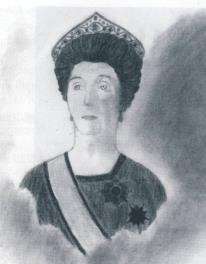Nazikeda Kadın (wife of Mehmed VI)
| Nazikeda Kadın نازك ادا قادين | |||||
|---|---|---|---|---|---|
 | |||||
| Imperial consort of the Ottoman Sultan | |||||
| Tenure | 3 July 1918 – 1 November 1922 | ||||
| Born |
Emine Fatma Marşania 9 October 1866 Tsebelda, Abkhazia, Russian Empire | ||||
| Died |
4 April 1941 (aged 74) Cairo, Egypt | ||||
| Burial | Abbasiye Cemetery | ||||
| Spouse | Mehmed VI | ||||
| Issue |
Münire Sultan Fenire Sultan Fatma Ulviye Sultan Rukiye Sabiha Sultan | ||||
| |||||
| Father | Hasan Ali Marşania | ||||
| Mother | Fatma Horecan Aredba | ||||
| Religion | Islam | ||||
Nazikeda Kadın (9 October 1866 – 4 April 1941; Ottoman Turkish: نازك ادا قادين) was a consort of Sultan Mehmed VI of the Ottoman Empire.
Life
Nazikeda Kadın was born on 9 October 1866 in Tsebelda, when Abkhazia came under Russian Empire. Born as Emine Marshan, she was a member of Abkhazian princely family Marshan. Her father was Prince Hassan Bey Marshan (1836-1877) and her mother was Princess Fatma Horecan Hanım Aredba, an Abkhazian.[1][2] She was the paternal granddaughter of Prince Ismail Bey. In 1877, Emine along with her sisters, Daryal and Naciye Hanım and cousins, Amine, Rumeysa, Pakize, Fatma and Kamile Hanım left their city of birth and arrived at Istanbul, where they were delivered at the palace of Cemile Sultan. Her aunt, Suzidil Hanım was a Lady-in-waiting to Cemile Sultan. She had two elder brothers Prince Mehmed Bey and Prince Abdülkadir Bey,[note 1]
She spent her childhood in the palace of Cemile Sultan where she took private lessons of piano. She was also interested in horse riding and used to ride horse at the park of Cemile Sultan's palace. She was a Lady-in-waiting to Cemile Sultan's daughter Fatma Hanımsultan. In 1884 she was noticed by Şehzade Vahideddin Efendi (future Mehmed VI) and he fell in love with her. He asked Cemile Sultan for her hand in marriage. She was married to Şehzade Vahideddin Efendi in the Ortaköy Palace, Constantinople, on 8 June 1885. She was declared as his principal consort. Three years after marriage, she gave birth to Münire Sultan, the in 1892 and 1894 to Fatma Ulviye Sultan and Rukiye Sabiha Sultan respectively.[1]

During the Turkish War of Independence which occurred between 19 May 1919 to 24 July 1923, she supported charity organisations, schools, hospitals and mosques. In 1922, Mehmed was deposed and exiled. She, together with other members of his family, was kept in house arrest at the Feriye Palace by order of the new parliament until 10 March 1924, when they were also sent into exile. She lived in San Remo in Italy until the death of her spouse in 1926, thereafter in France and from 1929 in Cairo, where she died in poverty on 4 April 1941 and was buried in Abbasiye Cemetery.[1][3][4]
Issue
Together with Mehmed, Emine Nazikedâ had four children:
- Münire Sultan (1888 – 1888);
- Fenire Sultan (1888 – 1888);
- Fatma Ulviye Sultan (11 September 1892, Ortaköy Palace, Ortaköy, Istanbul – 25 January 1967, Izmir, buried at Çengelköy, Üsküdar, Istanbul);
- Rukiye Sabiha Sultan (Ortaköy Palace, Ortaköy, Istanbul, 2 April 1894 – 26 August 1971, Istanbul, buried at Çengelköy, Üsküdar, Istanbul).[5]
Notes
- ↑ Also Abdulkadir Marschania of Tzebelda, turkish Name: Marşania Abdülkadir Bey, lived from 1862 to 1928.
References
| Wikimedia Commons has media related to Emine Nazikeda. |
- 1 2 3 Harun Açba (2007). Kadın efendiler: 1839-1924. Profil. ISBN 978-9-759-96109-1.
- ↑ Bir Çerkes prensesinin harem hatıraları. L & M. 2004. ISBN 978-9-756-49131-7.
- ↑ Yılmaz Öztuna (1989). İslâm devletleri: devletler ve hanedanlar. Kültür Bakanlığı. ISBN 978-9-751-70469-6.
- ↑ M. Çağatay Uluçay (2011). Padişahların kadınları ve kızları. Ötüken. ISBN 978-9-754-37840-5.
- ↑ Genealogy Of The Imperial Ottoman Family (2005)